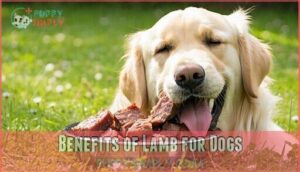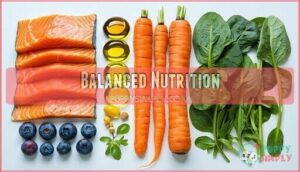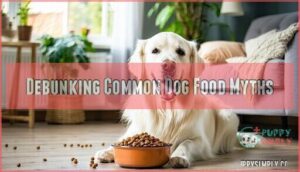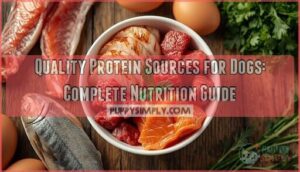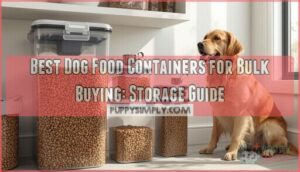This site is supported by our readers. We may earn a commission, at no cost to you, if you purchase through links.

Lamb offers excellent protein for muscle development and contains iron, zinc, and B vitamins that support your dog’s health.
It’s particularly beneficial for pups with food sensitivities since it’s considered a novel protein that most dogs haven’t been regularly exposed to.
The meat’s natural fats provide omega fatty acids for healthy skin and coat.
Always serve lamb cooked and boneless to prevent choking or bacterial infections.
Start with small portions when introducing it to avoid stomach upset.
Understanding the specifics of preparation and portion sizes can make all the difference in your dog’s lamb experience.
Table Of Contents
- Key Takeaways
- Can Dogs Eat Lamb?
- Can Dogs Eat Lamb Bones?
- Is Lamb Good for Dogs?
- Can Lamb Make Dogs Sick?
- Benefits of Lamb for Dogs
- Can Dogs With Allergies Eat Lamb?
- Lamb-Based Dog Food Options
- Consulting a Veterinarian for Dietary Decisions
- Debunking Common Dog Food Myths
- Frequently Asked Questions (FAQs)
- Conclusion
Key Takeaways
- You can safely feed your dog lamb when it’s thoroughly cooked to 165°F and served boneless – this eliminates bacterial risks and choking hazards while providing excellent protein for muscle development.
- Lamb works well for dogs with food allergies since it’s a novel protein – most dogs haven’t been regularly exposed to lamb, making it less likely to trigger allergic reactions than common proteins like chicken or beef.
- You should introduce lamb gradually and limit portions – start with small amounts mixed into their regular food and keep lamb to 10-15% of daily calories to prevent digestive upset.
- You’ll want to consult your veterinarian before adding lamb to your dog’s diet – they can assess your dog’s specific needs, allergies, and health conditions to ensure lamb is appropriate and safe.
Can Dogs Eat Lamb?
Yes, dogs can eat lamb safely when it’s properly prepared and fed in moderation.
Lamb offers excellent nutritional benefits for dogs, especially those with food sensitivities, but requires careful handling to avoid health risks.
Raw Lamb
Raw lamb dogs can enjoy offers excellent nutritional value with complete proteins and omega fatty acids.
Raw lamb delivers complete proteins and omega fatty acids that dogs absolutely love.
However, bacterial risks from Salmonella and E. coli make safe handling essential for raw preparation.
Key safety considerations for raw lamb:
- Bacterial Risks – Always source from reputable suppliers and handle with clean utensils
- Parasite Concerns – Freeze for three weeks minimum to reduce potential parasites
- Safe Handling – Store separately from human food and wash hands thoroughly
- Digestion Lamb Dogs – Introduce gradually to prevent digestive upset
Raw lamb nutrition dogs benefit from includes essential amino acids supporting muscle development, though proper preparation remains imperative for your pet’s safety.
Lamb Fat
Lamb fat contains high levels of saturated fats and provides concentrated calories.
While dogs can digest lamb fat efficiently, excessive consumption poses obesity risks and pancreatitis threats, especially in sensitive breeds.
Practice portion control by limiting fat content to 15-20% of daily calories.
Rendered lamb fat in commercial foods offers safer amounts than fatty trimmings, supporting healthy fatty acid balance.
Lamb Liver
Yes, you can safely feed your dog lamb liver as an occasional treat.
This nutrient-dense organ meat contains high levels of vitamin A (22,000 IU per 100g), iron (27mg per 100g), and B vitamins that support immune function and energy.
Cook thoroughly and limit serving sizes to one ounce weekly for medium dogs to prevent vitamin A toxicity from excessive dietary inclusion.
Lamb Kidney
Kidney nutrients in this organ make it a powerhouse addition to your dog’s meal rotation. Lamb kidney provides high-quality protein, B vitamins, and minerals that support immune function.
However, proper preparation methods and serving sizes matter for your canines to eat lamb safely.
Key considerations for lamb kidney feeding:
- Cooking Safety – Steam or lightly cook to eliminate parasites and bacteria
- Serving Sizes – Limit to 5% of weekly food intake maximum
- Potential Risks – High purine content may affect dogs with kidney issues
- Dog Lamb Diet Balance – Use as occasional supplement, not primary protein source
Is lamb safe as kidney? Yes, when prepared correctly and fed in moderation for ideal lamb for dogs nutrition.
Lamb Heart
Moving beyond kidney benefits, you’ll find lamb heart offers exceptional nutrient profile advantages for dogs.
This organ meat contains 26 grams of protein per 100 grams and provides coenzyme Q10 for heart benefits.
Safe preparation requires cooking methods that reach 165°F internally, and consider portion sizes of 1-2 ounces per 20 pounds of body weight when adding this powerhouse to your dog lamb diet.
Can Dogs Eat Lamb Bones?
Feeding your dog lamb bones requires careful consideration of the significant risks involved.
Cooked bones pose the greatest danger, as they splinter easily and can cause choking hazards or internal injuries requiring emergency surgery.
Raw bones offer better bone nutritional value and are safer for supervised bone chewing, but they still carry risks from bacterial contamination and potential splintering.
Bone size matters greatly – smaller bones increase choking risks, while larger bones may fracture teeth.
Even raw lamb bones should only be given under close supervision for 15-30 minutes maximum.
Consider bone alternative options like specially designed chew toys, bully sticks, or dental chews that provide similar benefits without the safety concerns.
These alternatives offer the same oral health benefits and mental stimulation without risking your dog’s wellbeing.
When weighing cooking bone safety against potential benefits, safer alternatives consistently prove the better choice for most dogs.
Is Lamb Good for Dogs?
Lamb stands out as a nutritionally dense protein that supports your dog’s overall health and wellbeing.
Lamb delivers exceptional nutrition that naturally supports your dog’s health and vitality.
This lean meat provides complete protein with all essential amino acids your pet needs for muscle development and energy.
Here’s what makes lamb particularly beneficial for dogs:
- High-quality protein – Contains 24.5g protein per 100g serving, supporting muscle growth and maintenance
- Rich nutrient profile – Packed with B vitamins (B3, B6, B12), iron, zinc, selenium, and phosphorus
- Omega fatty acids – Promotes healthy skin, shiny coat, and reduces inflammation throughout the body
- Excellent digestibility – Gentle on sensitive stomachs compared to beef or pork
- Hypoallergenic properties – Less likely to trigger allergic reactions than common proteins
- Natural tryptophan – Supports calmness and helps reduce anxiety in stressed dogs
- Lower pancreatitis risk – Leaner than fatty meats, making it safer for dogs with digestive sensitivities
- Versatile preparation methods – Works well cooked, ground, or in commercial lamb dog food formulations
- Appropriate portion sizes – Easy to measure and control for weight management
The lamb nutritional value combined with superior lamb digestibility factors make it an excellent choice for dogs with food sensitivities or those simply seeking premium nutrition.
Always make certain to remove bones and fat before serving lamb chops.
Can Lamb Make Dogs Sick?
While lamb offers many health benefits, certain situations can make your dog sick if you’re not careful. Understanding lamb risks dogs face helps you make informed feeding decisions.
Raw or undercooked lamb presents serious bacterial risks, including Salmonella, E. coli, and Listeria contamination. These pathogens cause severe digestive issues and require immediate veterinary consultation. Seasoned lamb compounds the problem since garlic, onions, and excessive salt create lamb toxicity concerns.
Overfeeding lamb, especially fatty cuts, triggers pancreatitis in sensitive dogs. The rich fat content overwhelms their digestive system, causing vomiting and diarrhea. Even dogs without previous food sensitivities can develop lamb allergy dogs experience over time.
Bone dangers pose additional threats:
- Cooked lamb bones splinter easily, causing internal injuries
- Raw bones carry choking hazards and bacterial contamination
- Sharp fragments puncture digestive organs
- Blockages require emergency surgery
Watch for allergic reactions like excessive scratching, ear infections, or chronic digestive issues. Some dogs develop sensitivities despite lamb’s hypoallergenic reputation.
Proper preparation and moderation prevent most complications.
Benefits of Lamb for Dogs
Lamb offers several compelling health benefits that make it an excellent protein choice for your furry friend.
This nutrient-dense meat provides high-quality protein, essential minerals, beneficial fatty acids, and gentle digestibility that can support your dog’s overall wellness and liveliness.
Protein Content
Naturally, lamb’s protein content stands out as one of its greatest nutritional advantages for your dog.
This lean protein source delivers 24.5 grams per 100-gram serving, packed with essential amino acids that fuel muscle growth and maintenance.
These nutrients support your pet’s energy levels while contributing to their daily intake requirements, making lamb meat an excellent addition to dog food formulations, due to its high protein content.
Iron Content
Beyond basic nutrition facts, iron absorption from lamb meat dogs consume depends on several key factors.
Lamb benefits dogs through heme iron, which offers superior bioavailability factors compared to non-heme sources found in plant ingredients.
This essential nutrient supports anemia prevention by enabling efficient red blood cell production.
However, supplementation risks exist when combining iron-rich dog food lamb with additional supplements, potentially causing toxicity.
Your dog’s digestive system processes these nutrients more effectively when lamb provides natural iron levels.
Always consult your veterinarian before adding iron supplements, as excessive amounts can harm your pet’s health.
Omega Fatty Acids
Your pup’s skin and coat will thank you for lamb’s omega fatty acids. These essential nutrients work like tiny healers, reducing inflammation throughout your dog’s body while supporting healthy joints and brain function.
Here are 5 key omega fatty acid benefits in lamb:
- Skin Health – Omega-3s repair damaged skin cells and reduce itchiness
- Coat Quality – Creates that glossy, soft fur you love to pet
- Inflammation Reduction – Calms irritated joints and tissues naturally
- Joint Support – Lubricates joints for better mobility and comfort
- Brain Function – Supports cognitive health and mental sharpness
These fatty acids make lamb meat dogs crave while delivering real health benefits. Ensuring adequate protein intake is vital, as essential amino acids support muscle repair.
Digestibility
Your dog’s digestive system handles lamb particularly well compared to other proteins.
Lamb Digestion occurs smoothly because the protein breakdown requires fewer Digestive Enzymes than beef or chicken.
Dogs with Sensitive Stomachs often show improved symptoms when switching to a puppy lamb diet or cooked lamb dogs meals.
The gentle nature of lamb promotes better Nutrient Absorption, supporting overall digestive health.
However, avoid lamb risks dogs face from raw preparations, which can introduce harmful bacteria and compromise your pet’s digestive wellness, related to Digestive Enzymes and lamb.
Novelty and Rewards
Beyond digestibility, lamb brings exciting possibilities to your dog’s routine. This protein source can transform ordinary mealtimes into rewarding experiences.
Lamb dog treats offer excellent Dietary Novelty for dogs who’ve grown tired of chicken or beef. Using lamb as Training Rewards during sessions provides Positive Reinforcement while introducing new flavors. This nutritious treat supports Behavioral Enrichment by engaging your dog’s senses with different textures and tastes.
Here’s how lamb enhances your dog’s experience:
- Novel protein: Breaks monotony in regular feeding routines
- High-value reward: Perfect for training sessions requiring motivation
- Sensory engagement: New textures and aromas stimulate interest
- Healthy variety: Reduces risk of developing food sensitivities
- Special occasions: Makes birthdays or achievements extra memorable
Consider rotating lamb treats with your dog’s regular food to maintain excitement. This healthy treat strategy keeps dogs engaged while supporting their nutritional needs through Lamb Treat Variety.
Can Dogs With Allergies Eat Lamb?
If your dog suffers from food allergies, lamb can be an excellent alternative protein since it’s less commonly used in commercial pet foods and as a result, less likely to trigger allergic reactions.
Many dogs with sensitivities to chicken, beef, or other proteins tolerate lamb well, making it a valuable option for managing dietary allergies.
Alternative to Common Proteins
Many dogs experience food sensitivities to common proteins like chicken and beef.
Lamb serves as an excellent novel protein alternative, with veterinary dermatology guidelines recommending lamb-based diets during elimination trials.
This protein rotation approach helps identify dietary intolerances while providing essential nutrients.
| Common Protein Issues | Lamb Benefits |
|---|---|
| Chicken allergies affect 15-25% of food-sensitive dogs | Hypoallergenic properties reduce allergic reactions |
| Beef sensitivities cause skin itching | Limited ingredient diets often feature lamb |
| Traditional proteins trigger GI upset | Easily digestible for sensitive stomachs |
| Cross-reactivity between similar proteins | Novel protein source breaks allergy cycles |
Introducing Lamb Gradually
When introducing lamb to dogs with potential allergies, veterinary nutritionists recommend a gradual approach over 7-10 days.
Start with small portions mixed into their current diet, monitoring for reactions.
This gradual increase allows your dog’s digestive system to adapt while enabling proper allergy monitoring.
Portion control prevents overwhelming sensitive stomachs, making the switch smoother and safer for hypoallergenic protein introduction, which is crucial for dogs with potential allergies.
Suitable for Sensitive Stomachs
Stomach troubles can make mealtime stressful for your furry friend.
Lamb offers exceptional digestibility for dogs with sensitive stomachs, thanks to its lean protein profile and hypoallergenic properties.
Veterinary nutritionist recommendations highlight lamb’s benefits:
- Enhanced nutrient absorption – easier processing reduces digestive strain
- Improved stool quality – less loose stools and digestive upset
- Lower pancreatitis risk – leaner than beef, gentler on pancreas
- Reduced digestive sensitivities – hypoallergenic protein minimizes reactions
- Better tolerance – formulas with lamb and rice soothe irritated stomachs
For dogs with allergies, novel protein sources like lamb can minimize allergic reactions.
Individual Tolerance
While lamb works for many allergic dogs, it’s not universally tolerated.
Not all dogs with sensitivities can handle lamb—up to 10% experience cross-reactivity with other proteins.
Individual tolerance varies based on breed differences, age factors, and health status.
Some dogs develop lamb allergy dogs symptoms like skin allergies or gastrointestinal upset despite initial success.
Monitor for digestive sensitivities and seek veterinarian advice.
Lamb-Based Dog Food Options
You’ll find plenty of commercial lamb-based dog foods designed specifically for dogs with dietary sensitivities or those who simply thrive on this protein source.
These options range from premium dry kibbles and wet canned foods to specialized therapeutic diets that veterinarians recommend for specific health conditions.
Dry Kibble and Canned Food
You’ll find lamb-based commercial dog food comes in both dry kibble and wet canned varieties.
These products offer convenient, balanced nutrition with lamb as the primary protein source, providing complete, balanced diet solutions for dogs requiring lamb-based nutrition.
High-quality dog food options guarantee proper kibble ingredients and canned benefits while meeting your dog’s nutritional needs, considering palatability factors.
Food processing methods preserve these factors, though proper storage guidelines matter for freshness, and you can easily find various lamb kibble online, which is a convenient option.
Both formats provide balanced nutrition for dogs, making them a suitable choice.
Specialized Diets for Health Conditions
Beyond regular lamb kibble and canned options, specialized therapeutic diets target specific health conditions.
These prescription-style formulas address your dog’s unique medical needs with carefully balanced ingredients.
Veterinary lamb diets help manage:
- Pancreatitis – Low-fat lamb formulations reduce pancreatic stress
- IBD and digestive issues – Highly digestible lamb proteins ease inflammation
- Severe skin allergies – Hypoallergenic lamb serves as novel protein in elimination diets
- Food allergies – Limited ingredient lamb formulas minimize allergic reactions
- Renal disease – Controlled phosphorus lamb diets support kidney function.
For dogs with sensitivities, consider lamb-based food options.
Balanced Nutrition
Looking at lamb-based dog foods, you’ll want options that provide proper nutrient ratios and balanced mix of nutrients for ideal canine nutrition.
These foods deliver essential nutrients and amino acids your dog needs while supporting healthy caloric intake.
Quality lamb diets offer nutritional benefits through dietary variety, reducing dependence on single proteins.
Consider supplementing with balanced dog food for optimal health.
Some dogs may need supplementation alongside their lamb diet.
Remember that hydration remains important regardless of food choice, so always provide fresh water.
Veterinary Consultation
Choosing the right lamb-based dog food requires professional veterinary advice. Your veterinarian can assess your dog’s specific dietary needs, breed predispositions, and existing health conditions before recommending appropriate options.
Professional vet consultation guarantees proper portion control and addresses potential concerns. This includes a range of services to ensure your dog’s health and well-being.
- Thorough allergy testing to identify sensitivities
- Customized veterinary nutrition plans for your dog’s age and activity level
- Ongoing veterinary pet care monitoring for dietary adjustments
Consulting a Veterinarian for Dietary Decisions
Making dietary changes for your dog shouldn’t be a guessing game, and that’s where your veterinarian becomes your most valuable ally.
Professional guidance guarantees you’re making informed decisions that support your dog’s unique health needs and circumstances, ensuring informed decisions are made.
Informed Choices
When choosing lamb for your dog, you’ll want to make informed decisions about lamb sourcing, preparation methods, and portion control.
A holistic veterinarian can guide you through breed considerations and help determine the right lamb serving size for your pet.
They’ll assess whether your dog has lamb allergy dogs symptoms and recommend safe lamb preparation dogs techniques.
Your vet can also suggest lamb recipe dogs options and create a balanced lamb diet plan customized to your dog’s specific needs and health status.
For quick questions, consider using a platform that offers convenient vet access.
Assessing Specific Needs
Your vet will thoroughly evaluate your dog’s unique dietary requirements by examining specific factors that directly impact nutritional choices.
- Age: Puppies need different nutrition than seniors
- Activity Levels: Working dogs require more calories than couch potatoes
- Health Conditions: Kidney disease or allergies affect protein choices
- Breed Considerations: Large breeds have different needs than toy breeds
- Life Stage: Pregnant or nursing dogs need specialized nutrition
This assessment guarantees lamb allergy dogs receive appropriate alternatives while meeting their size-specific advice and health status-specific advice requirements.
Benefits and Drawbacks
Weighing lamb’s nutrient density against potential drawbacks helps veterinarians provide balanced dietary guidance.
While lamb offers excellent protein and supports overall health, its higher fat content may trigger digestive issues in sensitive canines.
Vets assess allergy potential, bone risks from improper preparation methods, and whether cooked lamb suits your dog’s specific needs for ideal digestion.
Tailoring The Diet
Your veterinarian will create a customized dogs meal plan based on your pet’s age, weight, activity level, and health conditions.
They’ll establish proper calorie calculation and portion control guidelines while designing balanced meals that meet your dogs dietary needs.
For growing puppies, puppy needs require specific nutritional adjustments, and professional guidance guarantees dietary rotation incorporates safe treats appropriately for peak dogs health, ensuring proper calorie calculation.
Overall Well-being and Health
Your dog’s wellbeing depends on proper nutritional balance that supports nutrient absorption, muscle maintenance, and skin health.
A veterinarian’s dietary advice guarantees your pet receives high-quality dog food with holistic benefits, including anxiety reduction.
Professional guidance prevents digestive upset while making lamb a nutritious addition to your dog’s diet, optimizing overall health outcomes.
Debunking Common Dog Food Myths
You’ve probably heard countless myths about what dogs can and can’t eat, and lamb often gets caught up in this confusion.
Let’s separate fact from fiction regarding common dog food beliefs that might be steering you away from nutritious options like lamb.
Ingredient Misconceptions
Many pet owners believe myths about ingredients that can mislead feeding decisions.
While lamb offers excellent nutritional value for canines eat lamb diets, misconceptions persist about fat content and bone safety.
Some think all protein sources cause dog allergies equally, but lamb’s hypoallergenic properties make it gentler than common proteins.
Raw risks don’t apply to properly cooked lamb, and digestive upset often stems from poor preparation rather than the meat itself.
Quality lamb treats support protein needs when fed appropriately.
Protein and Kidney Health
You’ve likely heard the myth that high-protein diets damage healthy kidneys, but this misconception stems from confusion about dogs already suffering from kidney disease.
Quality protein supports your dog’s overall health when kidney function remains normal.
- Protein restriction only becomes necessary when veterinarians diagnose existing kidney disease, requiring careful monitoring of phosphorus levels and protein quality for proper renal support through high-quality dog food formulated to specific nutrition needs.
Grains in Dog Food
Grain controversies in dog nutrition often stem from misconceptions about canines’ dietary needs.
Contrary to popular belief, grains aren’t harmful fillers but provide valuable nutrients for most dogs.
Wheat, rice, and oats offer digestible carbohydrates, B vitamins, and fiber that support healthy digestion.
Grain allergies affect only 10% of dogs, making grain-free diets unnecessary for most pets.
Grain benefits include sustained energy and improved stool quality.
However, grain alternatives like sweet potatoes work well for sensitive dogs.
Quality matters more than grain presence—focus on balanced dog food with appropriate protein sources like lamb treats rather than avoiding grains entirely.
The presence of grains can be beneficial, and it is essential to consider the overall nutritional value, including digestible carbohydrates and fiber, when selecting a dog food.
Dietary Variety and Preferences
Contrary to popular belief, your dog doesn’t need constant dietary variety like humans do.
Dogs have simpler taste preferences and can thrive on consistent, high-quality nutrition.
However, food rotation between different protein sources can benefit picky eaters by preventing boredom and ensuring balanced dietary needs.
Lamb works well as an occasional treat or rotational protein, offering a tasty treat that supports your pet’s health.
Raw Food Feeding
Raw feeding lamb isn’t automatically safer than commercial diets.
Raw meat carries bacterial contamination risks including Salmonella and E. coli, which can harm dogs and families.
Bone consumption risks include choking and intestinal blockages.
Proper preparation best practices require rigorous hygiene, sourcing from reputable suppliers, and ensuring nutritional completeness through balanced ratios of muscle meat, organs, and appropriate supplements.
Frequently Asked Questions (FAQs)
Can lamb upset a dog’s stomach?
Lamb can upset your dog’s stomach if introduced too quickly, fed in large amounts, or if your dog has a lamb allergy. Start slowly and monitor for digestive issues.
How should lamb be prepared for dogs to ensure their safety?
While you might worry about preparation hassles, cooking lamb thoroughly eliminates bacteria and makes it safe.
Cook to 160°F without seasonings, cool completely, then mix with regular food in appropriate portions.
How much lamb should dogs eat daily?
Keep lamb to 10-15% of your dog’s daily calories. Start with 1 tablespoon per 10 pounds of body weight, adjusting based on your pup’s activity level and health needs.
Can puppies safely eat lamb meat?
Yes, puppies can safely eat lamb meat when it’s thoroughly cooked to 165°F and introduced gradually. Start with small amounts and consult your veterinarian before making dietary changes.
What temperature should lamb be cooked?
When cooking lamb for your furry friend, think of it as hitting the bull’s-eye for safety.
You’ll want to cook ground lamb to 160°F and other cuts to 165°F to eliminate harmful bacteria and keep your dog healthy.
Can senior dogs digest lamb easily?
Senior dogs can digest lamb quite well since it’s a gentle, easily digestible protein that’s less likely to trigger allergies or stomach upset compared to other meats.
Is grass-fed lamb better for dogs?
Grass-fed lamb offers superior nutritional benefits for your dog compared to grain-fed alternatives.
It contains higher omega-3 fatty acids, which support skin health and reduce inflammation, making it particularly beneficial for dogs with sensitive stomachs or allergies.
Conclusion
Understanding whether can dogs eat lamb safely requires examining both the benefits and proper preparation methods.
Lamb provides excellent protein, essential vitamins, and serves as a novel protein source for dogs with food sensitivities.
When cooked thoroughly and served boneless, lamb offers digestible nutrition that supports muscle development and coat health.
Always introduce lamb gradually and consult your veterinarian before making dietary changes, especially for dogs with existing health conditions or allergies.



